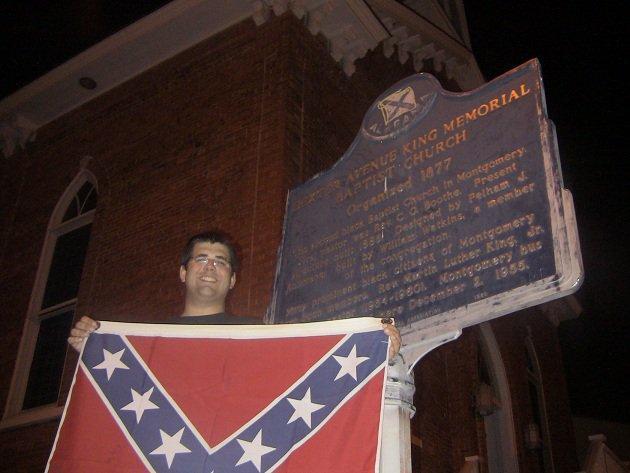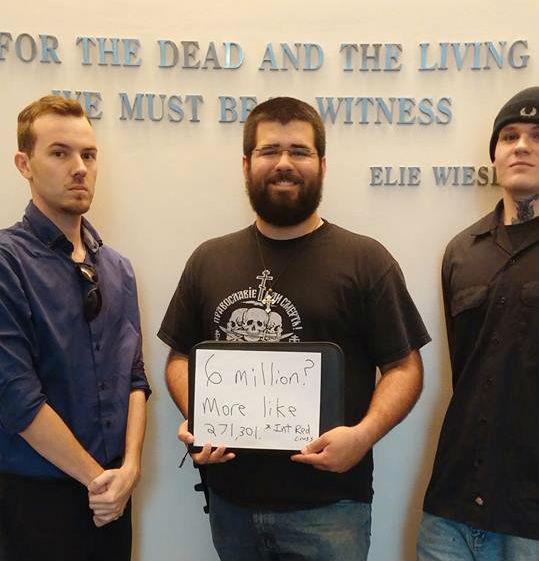Meet the American white supremacist who thinks Brexit is the best thing to happen to Europe since Hitler
Exclusive interview: 25-year-old Matthew Heimbach, described as ‘the face of a new generation of white nationalists’, founded the far-right group that provoked a recent bloody confrontation in Sacramento. Their next stop? The Republican convention.

Your support helps us to tell the story
From reproductive rights to climate change to Big Tech, The Independent is on the ground when the story is developing. Whether it's investigating the financials of Elon Musk's pro-Trump PAC or producing our latest documentary, 'The A Word', which shines a light on the American women fighting for reproductive rights, we know how important it is to parse out the facts from the messaging.
At such a critical moment in US history, we need reporters on the ground. Your donation allows us to keep sending journalists to speak to both sides of the story.
The Independent is trusted by Americans across the entire political spectrum. And unlike many other quality news outlets, we choose not to lock Americans out of our reporting and analysis with paywalls. We believe quality journalism should be available to everyone, paid for by those who can afford it.
Your support makes all the difference.There was a grim inevitability to the violence that broke out on the steps of the California State Capitol last weekend – but perhaps that was the whole point. Around 30 members of two far-right groups, the Traditionalist Worker Party (TWP) and the Golden State Skinheads, had gathered for a demonstration in Sacramento on Sunday at high noon, when they were confronted outside the capitol building by some 400 anti-fascist counter-protesters. At least 10 people were injured in the bloody melee that followed, two of whom sustained critical stab wounds.
Police said the counter-protesters threw the first punches, thus handing the far-right combatants a propaganda coup. Yet the man who most likely orchestrated the event was 2,000 miles away, at home in Indiana. Matthew Heimbach, the TWP’s 25-year-old chairman, has been described by the Southern Poverty Law Centre (SPLC) as the “face of a new generation of white nationalists”. The demonstration, he says, was a response to violence aimed at supporters of Donald Trump during the presumptive Republican presidential nominee’s recent campaign rallies in Chicago and San Jose.
“Anyone who disagrees with the far-left agenda – not just those of us who are nationalists, but those who support Mr Trump for president – is under attack,” Heimbach says. “This was a stand for freedom of speech and freedom of assembly for nationalists. We knew there was probably going to be violence brought by the left, and that we would stand against it.” The attacks on his group’s members in Sacramento, he alleges, were “premeditated attempted murder”.
It's been something of a banner week for Heimbach, who also claimed the result of the UK’s EU referendum as a nationalist triumph, tweeting that “#Brexit is the greatest European nationalist victory since 1933”. The country’s decision to leave the EU, he says, “is the first blow against globalism in the post-war period: a nation re-establishing its sovereignty, organising to say, ‘We don’t want foreign powers dictating how our country is going to be run.’ They’re taking power back for themselves”.
Comparing the Brexit vote to the rise of the Nazi party, he goes on: “In 1933, the German economy was being destroyed by the Versailles treaty. So the German people, in a very similar way, said they were going to kick out the foreign powers and the bankers, and establish themselves as a German state for the German people. Now you’ve got global elites saying they’re going to punish Britain and hurt it economically. It’s the same thing that happened to Germany after 1933: they had to deal with economic boycotts and attacks by other powers.”
Heimbach’s opinion regarding Hitler’s Third Reich is unambiguous. He has espoused virulently anti-semitic views in speeches and blog posts, and once published a picture of himself on a visit to the US Holocaust Memorial Museum in Washington DC, holding a sign that read: “Six million? More like 271,301.” His Brexit tweet was accompanied by a photograph of the British fascist leader Sir Oswald Mosley, whom he describes as “an inspiration”, insisting: “If people had only listened to [Mosley] then we wouldn’t have had the Second World War.”
The American extreme right is feeling emboldened by the rise of Trump, whose presidential campaign has energised white supremacists and helped to unleash a swarm of online anti-semitism. In March, Heimbach was caught on camera at a Trump rally in Kentucky, wearing a “Make America Great Again” cap as he shoved and yelled abuse at a Black Lives Matter protester. This week the TWP announced it would send members to the GOP convention in Cleveland, to ensure that Trump supporters “are defended from leftist thugs”.
But in spite of his apparent enthusiasm for Trump, the TWP leader did not vote in the 2012 presidential election and probably won’t vote this November either. Nor will his group endorse Trump. “He’s not a white nationalist,” Heimbach says. “But we appreciate that he agrees with us on globalism, on free trade, on sovereignty, on immigration – issues that the Republican party has ignored, even though their base cares about them. Trump is introducing those ideas to the mainstream, and people are responding very strongly.”
Born in Poolesville, Maryland, an affluent town whose population of fewer than 6,000 people is more than 93 per cent white, Heimbach’s father (from whom he is now estranged) was a history teacher, and he became fascinated by the world wars as a child. He studied history at Towson University in Baltimore – a city of more than 600,000, about two-thirds of them black – and achieved widespread notoriety in 2012 when he founded a White Student Union, whose members would patrol the campus armed with pepper spray to combat what he called a “black crime wave”.
He traces his ideological development to two books that he read as an impressionable teenager: Who Are We? The Challenges to America’s National Identity by Samuel P Huntington, which blames Hispanic immigration for the problems afflicting American whites, and The Death of the West, in which Patrick J Buchanan argues that the US will be a third-world nation by 2050. Not entirely coincidentally, 2050 is also the moment when America’s non-white citizens are expected to outnumber whites.
Mr Heimbach founded the TWP with his father-in-law, Matthew Parrott, in 2015. The group’s mission, according to its website, is “defending faith, family, and folk against the politicians and oligarchs who are running America into the ground,” by “[leading] Americans toward a peaceful and prosperous future free from economic exploitation, federal tyranny, and anti-Christian degeneracy”. The group purports to be “America’s first political party created by and for working families”, although it also seems prepared to work alongside historically violent neo-Nazi groups such as the Golden State Skinheads.

The TWP hopes to become an umbrella organisation for groups from across the white supremacist spectrum, warns Marilyn Mayo, a research fellow with the Anti-Defamation League’s (ADL) Centre on Extremism. “Matthew Heimbach is trying to bridge the gap between ‘intellectual’ racists and the neo-Nazis and skinheads,” she says. “In the past it hasn’t been possible to unite all these different groups: there’s always too much infighting. But he is seen as someone who appeals to a range of white supremacists because he speaks very articulately about his ideology. It’s a racist, anti-semitic ideology, but he does speak about it well.”
Ryan Lenz, who has long tracked Mr Heimbach for the SPLC’s Hatewatch blog, compares him to David Duke, the former Grand Wizard of the Ku Klux Klan, who got more than 600,000 votes when he ran for Governor of Louisiana in 1990. “Matthew Heimbach is this generation’s David Duke, without a doubt,” Lenz says. “He is almost affable, certainly garrulous, even charming at times – the most of any mouthpiece for hateful ideologies that I’ve ever seen.”
So far, the TWP numbers no more than a few hundred members, but it has established 14 chapters across the US, most of them in the white, working class Appalachia region. The party intends to run candidates in local elections as soon as 2018. They’re setting up an online store that will stock (among other things) Oswald Mosley T-shirts, and a music label featuring artists such as Paddy Tarleton, a nationalist singer-songwriter who has already memorialised last weekend’s fisticuffs in a hate-filled folk song “The Battle of Sacramento”.
The group’s medium-term political goals sound not unlike those of some right-wing Republicans: ending illegal immigration, same-sex marriage and abortion; returning jobs to the US industrial heartland; and cutting off foreign aid. But Heimbach’s ultimate ambition is rather more spectacularly objectionable – to carve up the US into a collection of ethnic states. “The best way to solve the problem in the US is to establish ethnic homelands for each people, to agree that the multicultural experiment has failed and nobody is happy in this system,” he says.
“Groups such as Black Lives Matter want black police officers in black neighbourhoods and black teachers to teach black children and black lawmakers to make decisions for the black community. So I say: empower them, give them sovereignty and self-determination, give that to the Chicano movement in the American South-west, where they are the demographic majority. All we’re saying is that we, as whites in America, should have that right as well. And there should also be an area for those that want to continue living in a multicultural society.”
A landscaper by day, Heimbach lives in rural Indiana with his wife Brooke and their young son, Nicholas, who is named after the last Russian Tsar. During the couple’s European honeymoon in 2014, he stopped off to speak at a rally held by the Czech far-right Workers’ Party. He has addressed the ultra-nationalist National Democratic Party in Germany and met with members of Greece’s Golden Dawn. Last year, when he was banned from entering the UK by Home Secretary Theresa May, he posted the exclusion letter on Twitter, with the message: “I am now banned from England for being a nationalist while 10ks of radical Muslims are welcomed.”
Heimbach says he has “huge respect for the work the British National Party did under Nick Griffin’s leadership”, although he appears to be less impressed by Britain First. “Britain First spend all of their time complaining about Muslim immigration,” he says. “They never seem to talk about the global oligarchs and the financiers and the bankers that are the people that are pushing for this mass migration to destroy union organising, drag down wages and break apart national sovereignty. They’re complaining about the problem, not the cause.”
The SPLC is increasingly concerned by the level of contact being cultivated between nationalist groups in Europe and the US. “Every year we meet with international experts to talk about transatlantic ties in hate and extremism,” Lenz says. “We track the migration of ideas to see who is influencing who, and the past couple of years have seen an increase in the mirroring of ideas expressed by extremists in Europe by those in the United States. The Brexit vote is just one example of nationalism being expressed though the political process. There’s a very healthy and vibrant marketplace for racist ideas. It’s terribly frightening.”
Join our commenting forum
Join thought-provoking conversations, follow other Independent readers and see their replies
Comments